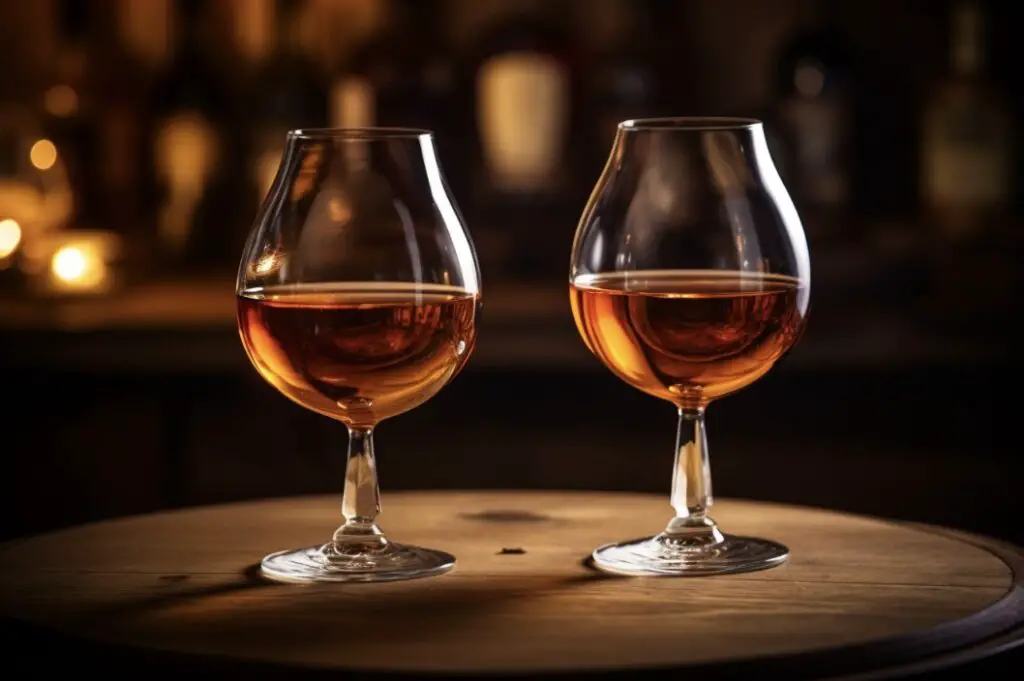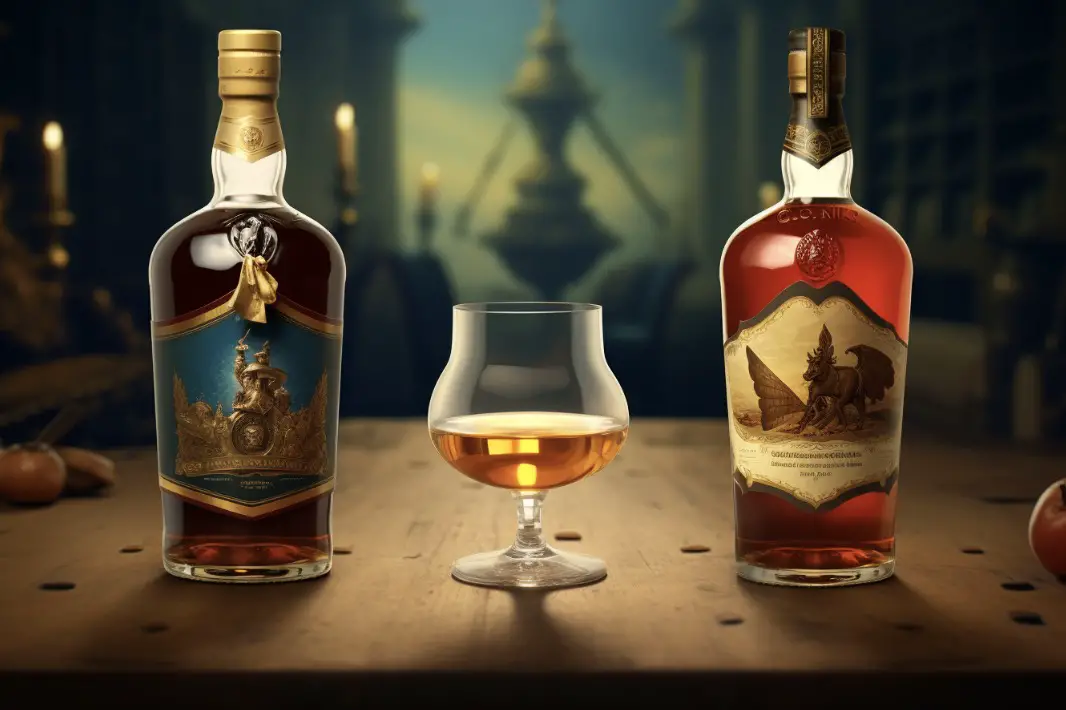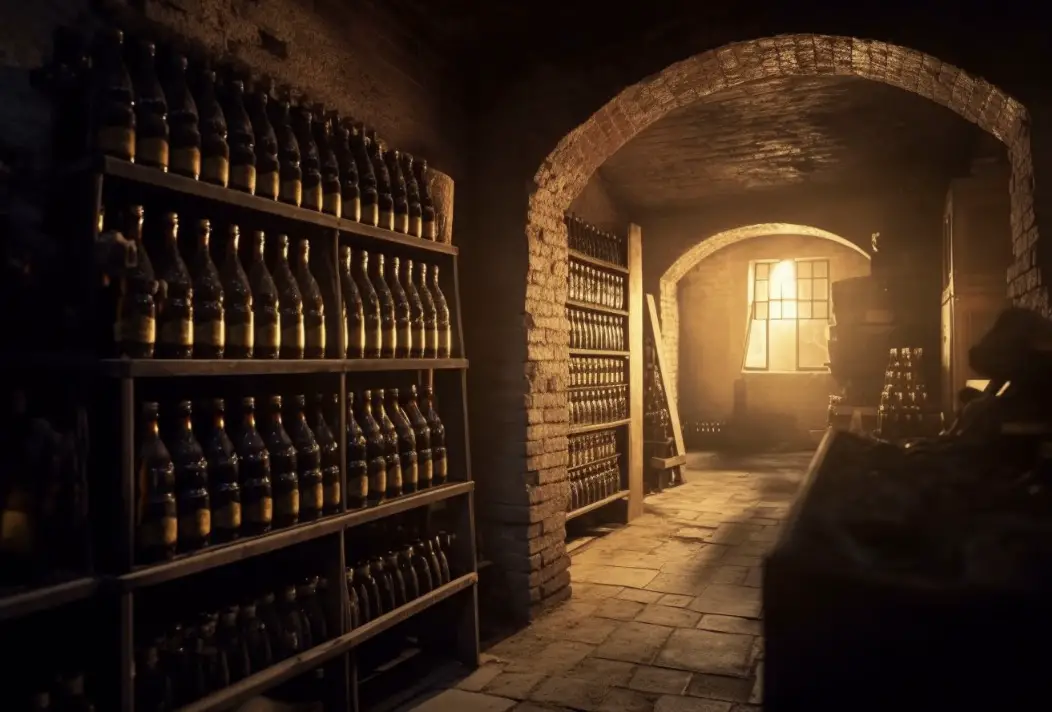Cognac and rum are two popular spirits that are often enjoyed neat or used as the base for various cocktails.
While both are distilled from fermented products and aged in barrels, they have distinct differences that set them apart.
In this blog post, we’ll delve into the world of cognac and rum, discussing their origins, production methods, flavor profiles, and more.
So, let’s explore the fascinating world of these two spirits to answer the question: What is the difference between cognac and rum?
Origins and History
Cognac
Cognac is a type of brandy that is exclusively produced in the Cognac region of France. The spirit has a rich history dating back to the 16th century, when Dutch traders introduced the process of distillation to the French. Cognac quickly gained popularity and became a highly sought-after luxury item throughout Europe.
Rum
Rum, on the other hand, has its origins in the Caribbean. It is believed to have been first distilled in the 17th century on sugar plantations, where it was discovered that molasses, a byproduct of sugar production, could be fermented and distilled to create a potent alcoholic beverage.

Rum soon became a staple for sailors and eventually spread across the globe.
What is difference between rum and cognac/brandy?
So, if we step a step back and consider brandy as the general group to which cognac belongs, we can decipher some of their fundamental differences more easily.
Rum and brandy are both types of distilled spirits, but they differ in their base ingredients, production methods, and aging processes.
1. Base Ingredients:
– Rum: Rum is made from sugarcane byproducts, such as molasses or sugarcane juice. The fermentation and distillation of these sugarcane derivatives produce a spirit that is then aged or bottled.
– Brandy: Brandy is made by fermenting and distilling fruit juices, typically grapes. However, brandy can also be produced from other fruits like apples, pears, cherries, or plums. The resulting spirit is then aged or bottled.
2. Production Methods:
– Rum: The production of rum involves fermenting the sugarcane byproducts to convert the sugars into alcohol. This fermented liquid, known as a wash, is then distilled to separate the alcohol from impurities. The distillate is then aged in barrels, often made from oak, to develop its flavor and character.
– Brandy: Brandy production begins with the fermentation of fruit juice, which converts the fruit sugars into alcohol. The resulting liquid, called wine or cider depending on the fruit used, is then distilled to create a higher alcohol concentration. Similar to rum, brandy is also aged in barrels, typically oak, to enhance its flavor and complexity.
3. Aging and Flavor Profiles:
– Rum: Rums can be aged for varying periods, ranging from a few months to several years. The aging process allows the spirit to interact with the wood barrel, resulting in the absorption of flavors and aromas. Depending on the aging time and the type of barrel used, rums can exhibit a wide range of flavors, including caramel, vanilla, tropical fruit, and spices.
– Brandy: Brandy aging can also vary significantly, with some brandies aged for as little as a year and others for several decades. The aging process contributes to the development of flavors such as dried fruits, nuts, vanilla, and oak. The specific fruit used in brandy production can also influence the flavor profile, with grape brandies often displaying more wine-like characteristics.
In summary, the main differences between rum and brandy lie in their base ingredients, production methods, and flavor profiles.
Rum is made from sugarcane byproducts, while brandy is made from fermented fruit juices, typically grapes. Both spirits are aged in barrels, but the specific aging time and type of barrel used can greatly impact their flavors.
Production Methods
Cognac
Cognac is made from white grapes, primarily the Ugni Blanc variety. The grapes are harvested, pressed, and fermented into a low-alcohol wine, which is then distilled twice in copper pot stills.

The resulting spirit, known as eau-de-vie, is aged in French oak barrels for a minimum of two years. The aging process allows the cognac to develop its complex flavors and deep amber color.
Rum
Rum is produced from sugar cane or its byproducts, such as molasses or sugar cane juice. The base material is fermented, and the resulting liquid is distilled either in pot stills, column stills, or a combination of both. The type of still used can greatly affect the final flavor profile of the rum. After distillation, the rum is aged in barrels, typically made of American oak, for varying lengths of time.
Classification and Aging
Cognac
Cognac is classified based on its age, with the following designations:
– VS (Very Special): Aged for a minimum of two years
– VSOP (Very Superior Old Pale): Aged for a minimum of four years
– XO (Extra Old): Aged for a minimum of six years
Rum
Rum does not have a standardized classification system, but it is often categorized by its color and aging:
– White Rum: Light in flavor and typically aged for a short period or filtered to remove color
– Gold Rum: Aged in oak barrels, giving it a golden color and more complex flavors
– Dark Rum: Aged for a longer period in heavily charred barrels, resulting in a rich, dark color and robust flavor profile
Flavor Profiles
Cognac
Cognac is known for its complex and nuanced flavors, which develop during the aging process. Common flavor notes include dried fruit, vanilla, oak, nuts, and spices. The overall profile is rich and smooth, with a warming finish.
Rum
Rum’s flavor profile can vary greatly depending on the production methods, type of sugar cane used, and aging process. In general, rum can range from light and delicate to rich and robust. Flavor notes can include tropical fruit, caramel, molasses, vanilla, oak, and spices.
Popular Brands and Producers
Cognac
Some of the most renowned cognac producers include:
– Hennessy
– Rémy Martin
– Courvoisier
– Martell
Rum
Popular rum brands and producers include:
– Bacardi
– Havana Club
– Mount Gay
– Appleton Estate
Mixology and Cocktails
Cognac
Cognac is often enjoyed neat or on the rocks, but it can also be used as the base for various cocktails. Classic cognac cocktails include the Sidecar, French 75, and Brandy Alexander.
Rum
Rum is an incredibly versatile spirit that is used in a wide range of cocktails. Some of the most iconic rum-based cocktails are the Mojito, Daiquiri, Dark ‘N’ Stormy, and Piña Colada.
Conclusion
So, what is the difference between cognac and rum? While both are distilled spirits aged in barrels, they have distinct differences in their origins, production methods, and flavor profiles. Cognac is made from grapes and has a rich, complex flavor, while rum is made from sugar cane and can vary greatly in taste. Both spirits have a storied history and are used in a variety of cocktails, making them essential additions to any home bar.
To sum up, here are 10 key facts about cognac and rum:
1. Cognac is made from grapes, while rum is made from sugar cane.
2. Cognac is produced in the Cognac region of France, while rum has its origins in the Caribbean.
3. Cognac is distilled twice in copper pot stills, while rum can be distilled in pot stills, column stills, or a combination of both.
4. Cognac is aged in French oak barrels, while rum is typically aged in American oak barrels.
5. Cognac has a complex and nuanced flavor profile, with notes of dried fruit, vanilla, oak, nuts, and spices.
6. Rum’s flavor profile can range from light and delicate to rich and robust.
7. Cognac is classified based on its age, with designations such as VS, VSOP, and XO.
8. Rum is often categorized by its color and aging, with classifications such as white rum, gold rum, and dark rum.
9. Classic cognac cocktails include the Sidecar, French 75, and Brandy Alexander.
10. Iconic rum-based cocktails are the Mojito, Daiquiri, Dark ‘N’ Stormy, and Piña Colada.
FAQs
Which is stronger rum or brandy?
Both rum and brandy can vary in strength depending on factors such as the production process and aging. However, in general, brandy tends to have a higher alcohol content compared to rum. Brandy typically ranges from 35% to 60% alcohol by volume (ABV), while rum typically ranges from 35% to 50% ABV. It’s important to note that there are exceptions and variations within each category, so it’s always advisable to check the specific alcohol content of a particular brand or type of spirit.
Is brandy a strong alcohol?
Yes, brandy is considered a strong alcohol. It typically has an alcohol by volume (ABV) ranging from 35% to 60%, depending on the specific brand and style. The high alcohol content is a result of the distillation process used to produce brandy. It is important to consume brandy responsibly and in moderation, as with any other alcoholic beverage.
What is the alcohol content of brandy vs rum?
The alcohol content of brandy and rum can vary depending on the specific product and brand. However, in general, brandy tends to have a higher alcohol content compared to rum. Brandy typically ranges between 35% and 60% alcohol by volume (ABV), with most commonly falling around 40% ABV. On the other hand, rum usually has an alcohol content ranging from 37.5% to 50% ABV, with the majority falling around 40% ABV. It’s important to note that these are average ranges, and there can be variations among different brands and styles of brandy and rum. Always check the label or product information for the specific alcohol content of a particular brand or type of brandy or rum.
Is brandy heavy alcohol?
Yes, brandy is considered a heavy alcohol. Brandy typically has an alcohol content ranging from 35% to 60%, depending on the specific type and brand. The higher the alcohol content, the heavier the drink is considered. Brandy falls into the category of spirits or distilled beverages, which generally have a higher alcohol content compared to beer or wine. It is important to consume brandy or any alcoholic beverage responsibly and in moderation.




